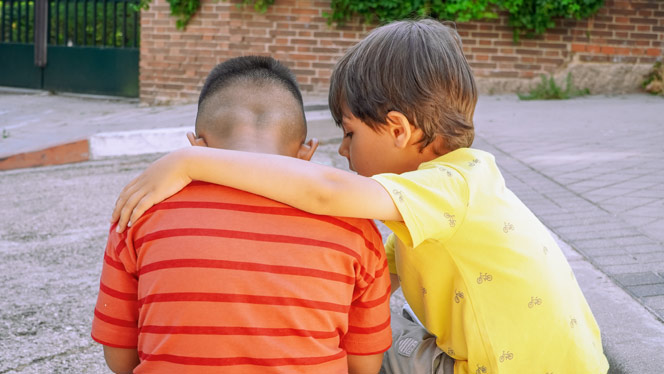Making New Friends This Fall
National Heritage AcademiesNational Heritage Academies
Articles by National Heritage
-
National Heritage Academies: A Unique K-12 Education at Grand River Prep
Published: Aug 16, 2024
-
Grand River Prep and Excel Charter Academy Students Collaborate to Produce Holiday Music
Published: Dec 16, 2022
The new school year approaches, and while it can be an exciting time, some scholars face anxiety about making friends in their class or grade level. National Heritage Academies (NHA) Special Education Supervisor Laura Katerberg shared some tips and initiatives that will help scholars make new connections this year.
Get to Know Your Child’s Interests and Start Early
One of the most natural ways for kids to make connections is through common interests. These interests may come in sports, art, music, etc.
Katerberg said that understanding the likes and dislikes of your scholar is crucial to supporting them as they make new companions throughout the school year.
“No. 1 is getting to know your kid and what they're interested in,” Katerberg said. “Then, as adults, we can model these things for them.”
Getting involved with these interests is important. Whether it’s playing sports or performing music, participating and asking questions helps scholars find what they like, which will help them connect with classmates.
“We can show them how to ask others about these topics or just to play,” Katerberg said.
Something as simple as playing can be a crucial step early on for a scholar’s development. Katerberg mentioned the 10-minute rule as an effective strategy for young children.
“Ten minutes of uninterrupted play can go miles for kids,” Katerberg said. “This strategy is building skills and it’s helping build them at a young age.”
The social skills children build early on will help them find others with common interests and lay the foundation of a new friendship.

Making new friends can bring students anxiety this back-to-school season, but finding common ground is a good starting place to grow new friendships.
Adult Partnerships
Another important piece of the friendship-making puzzle is a student’s relationship with the adults in their life. These relationships can boost confidence and show scholars best practices.
“It is really important that we’re fostering and providing opportunities for these social skills to grow at a young age,” Katerberg said. “It’s also important for adults to have these skills so we know how to teach and model them.”
Using positive relationship-building skills as examples to scholars will help them see what it is like to make a friend. Katerberg mentioned these actions can be picked up and used in the real world. “What we like to say is ‘model without expectation,’” Katerberg said.
“What that means is that we’re constantly modeling skills without demanding a response from those around us. We’re modeling without the expectation of them copying us, but we are constantly thinking about our actions and how our kids are picking up on them.”
Peer to Peer Program
One initiative coming to select NHA partner-schools this fall is the Peer to Peer Program. Resources for the program come from Grand Valley State University but it’s implemented at the school level by staff members on site.
Peer to Peer connects students with and without disabilities across the school, promoting belonging for everyone in the building. Katerberg said five West Michigan schools plan to support Peer to Peer.
The program identifies students who may need help building social skills and brings in fellow students to model friendship-building and play. This approach moves away from a helping model (where one student helps another), and instead emphasizes students actively engaging with one another to form natural friendships.
“We’re not fixing a problem,” Katerberg said. “We’re facilitating and trying to create a level playing field for all students to form friendships. We’re not trying to make neurodivergent students neurotypical. We want to have these students meet each other where they are and form friendships.”

The Peer-to-Peer program will be in five NHA schools this year. The initiative is meant to connect students with and without disabilities to for natural friendships.
Visit our recent news blog for more stories about NHA schools.
About National Heritage Academies
National Heritage Academies (NHA) is a network of more than 100 tuition-free, public charter schools across nine states, serving more than 65,000 students in kindergarten through 12th grade. For more information, visit nhaschools.com.
Get to Know Your Child’s Interests and Start Early
One of the most natural ways for kids to make connections is through common interests. These interests may come in sports, art, music, etc.
Katerberg said that understanding the likes and dislikes of your scholar is crucial to supporting them as they make new companions throughout the school year.
“No. 1 is getting to know your kid and what they're interested in,” Katerberg said. “Then, as adults, we can model these things for them.”
Getting involved with these interests is important. Whether it’s playing sports or performing music, participating and asking questions helps scholars find what they like, which will help them connect with classmates.
“We can show them how to ask others about these topics or just to play,” Katerberg said.
Something as simple as playing can be a crucial step early on for a scholar’s development. Katerberg mentioned the 10-minute rule as an effective strategy for young children.
“Ten minutes of uninterrupted play can go miles for kids,” Katerberg said. “This strategy is building skills and it’s helping build them at a young age.”
The social skills children build early on will help them find others with common interests and lay the foundation of a new friendship.

Making new friends can bring students anxiety this back-to-school season, but finding common ground is a good starting place to grow new friendships.
Adult Partnerships
Another important piece of the friendship-making puzzle is a student’s relationship with the adults in their life. These relationships can boost confidence and show scholars best practices.
“It is really important that we’re fostering and providing opportunities for these social skills to grow at a young age,” Katerberg said. “It’s also important for adults to have these skills so we know how to teach and model them.”
Using positive relationship-building skills as examples to scholars will help them see what it is like to make a friend. Katerberg mentioned these actions can be picked up and used in the real world. “What we like to say is ‘model without expectation,’” Katerberg said.
“What that means is that we’re constantly modeling skills without demanding a response from those around us. We’re modeling without the expectation of them copying us, but we are constantly thinking about our actions and how our kids are picking up on them.”
Peer to Peer Program
One initiative coming to select NHA partner-schools this fall is the Peer to Peer Program. Resources for the program come from Grand Valley State University but it’s implemented at the school level by staff members on site.
Peer to Peer connects students with and without disabilities across the school, promoting belonging for everyone in the building. Katerberg said five West Michigan schools plan to support Peer to Peer.
The program identifies students who may need help building social skills and brings in fellow students to model friendship-building and play. This approach moves away from a helping model (where one student helps another), and instead emphasizes students actively engaging with one another to form natural friendships.
“We’re not fixing a problem,” Katerberg said. “We’re facilitating and trying to create a level playing field for all students to form friendships. We’re not trying to make neurodivergent students neurotypical. We want to have these students meet each other where they are and form friendships.”

The Peer-to-Peer program will be in five NHA schools this year. The initiative is meant to connect students with and without disabilities to for natural friendships.
Visit our recent news blog for more stories about NHA schools.
About National Heritage Academies
National Heritage Academies (NHA) is a network of more than 100 tuition-free, public charter schools across nine states, serving more than 65,000 students in kindergarten through 12th grade. For more information, visit nhaschools.com.
